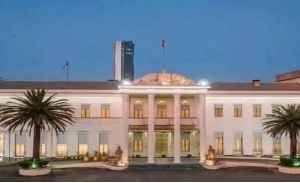
Addis Ababa, the vibrant Ethiopian and African capital, has been undergoing a remarkable transformation in recent years. The development of key corridors in different parts of the city is changing the landscape of the city. These corridors are bringing about tangible improvements in infrastructure, transportation, and the overall quality of life for residents.
The Addis Ababa Corridor Development project was introduced by Prime Minister Abiy Ahmed (PhD) last year. Since the commencement of the project, the city has gained momentum through the provision of new green areas and recreation centers that will have a significant role in boosting the influx of tourists.
Residents of the city also give thumbs up to the project as it plays a positive role in improving connectivity, reducing traffic congestion, and enhancing the overall urban experience for residents and visitors alike. These corridors serve as vital arteries that connect different parts of the city, creating a more efficient and sustainable transportation network.
Accordingly, the development of these corridors has had a profound impact on the cityscape, transforming once congested and chaotic areas into vibrant and accessible spaces. With improved public transportation options, residents now have greater mobility and can easily access key amenities such as schools, hospitals, and shopping centers.
During a wide-ranging discussion carried out with city administrators, residents, religious institutions, and other stakeholders, Addis Ababa Mayor Adanech Abebie said that the propelling of community concerns in the corridor development projects is crucial for the timely and impactful execution of the corridor project.
The dialogue was held with pertinent stakeholders seeking to assess the progress of ongoing development projects and chart a path forward. The Mayor underscored that the redevelopment efforts have made the capital more livable and dignified for all residents, not just the wealthy. “Our priority is to ensure the city lives up to its name by addressing the needs of every citizen,” she stated.
The Mayor also pledged to incorporate participants’ feedback, describing stakeholders’ engagement as an essential platform for inclusive insights and valuable contributions. She applauded residents for their role in the project’s progress, which aligns with plans to nurture responsible generations and combat poverty.
According to the mayor, the city administration aims to improve socioeconomic development while creating a city that guarantees a dignified life for all. In the first phase of redevelopment, 8.7 billion Birr was disbursed to compensate private homeowners to relocate from the actual corridor project sites.
The Addis Ababa City Cabinet Affairs Head Tilahun Worku stressed that Addis Ababa’s role as a hub for international diplomacy requires leveraging the “latecomer advantage” by implementing inclusive development. He reported that 50,000 jobs were created, Small and Medium Enterprise (SMEs) were stimulated, and working cultures within communities were improved during the project’s first phase.
However, challenges such as construction input shortages, skill gaps, unseasonal rainfall, and resident awareness issues affected progress. Addressing these setbacks, Tilahun stressed the importance of continued public engagement to ensure residents are actively involved in the next phases.
The project also sets the stage for new developments, including the construction of an international convention center and enhanced conference tourism.
Participants raised concerns about infrastructure, social welfare, sustainable settlements, and the need for fair compensation. They urged leadership to streamline pro-poor initiatives, conduct research-based development, and address bureaucratic delays affecting the project’s progress.
The city administration reaffirmed its commitment to ensuring inclusive, research-driven development to make Addis Ababa a model of sustainable growth and livability for all its citizens.
What is more, the Addis Ababa corridor development has spurred economic growth and investment in the city, attracting new businesses and creating employment opportunities for local residents. As the city continues to evolve, these corridors will play a crucial role in shaping its future development and enhancing the quality of life for its inhabitants.
In addition to improving transportation infrastructure, the Addis Ababa corridor development projects have also focused on enhancing urban planning and design. By creating pedestrian-friendly walkways, green spaces, bike lanes, and mixed-use developments along the corridors, the city is fostering a more sustainable and livable environment for its residents.
Furthermore, these corridor developments have integrated smart technologies and innovative urban design concepts to create a more resilient and environmentally friendly city.
The experts also accentuate that the corridor development is a comprehensive urban planning project aimed at improving the connectivity and accessibility of different parts of the city. This development initiative focuses on creating well-designed corridors that integrate various modes of transportation, such as buses, light rail, and pedestrian pathways.
By investing in efficient transportation systems, sustainable urban planning, and innovative design concepts, the city’s corridor development serves as a testament to the effectiveness of these strategies in improving the overall quality of life in urban areas. Addis Ababa is positioning itself as a leading city in Africa and a model for sustainable urban development. With continued investment and community engagement, the city is on track to realize its vision of a modern and vibrant metropolis.
In sum, the visible change that the corridor development brought in Addis Ababa could become a role model to other urban areas in the country and beyond. Several cities also launched similar corridor development project. The Addis Ababa city’s ongoing corridors development will play a crucial role in making the city more livable, sustainable, and attractive to residents and visitors alike. The projects are witnessing a tangible change in transforming the cityscape of Ethiopia’s capital and shaping its future growth and development.
BY TEWODROS KASSA
THE ETHIOPIAN HERALD FRIDAY 1 NOVEMBER 2024





